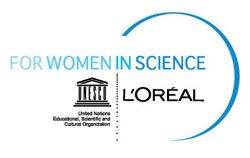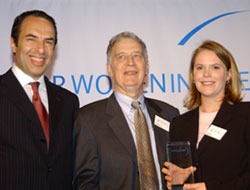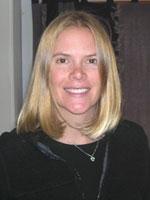 |

For further information, contact the MBL Communications Office at (508) 289-7423 or e-mail us at comm@mbl.edu
For Immediate Release: May 24, 2007
Contact: Gina Hebert, MBL, 508-289-7725; ghebert@mbl.edu
MBL Scientist Julie Huber Honored with 2007 L’Oréal USA Fellowship for Women in Science
Research helps understanding of how microbial populations function in and regulate the world’s oceans
MBL, WOODS HOLE, MA—MBL (Marine Biological Laboratory) Assistant Scientist Dr. Julie Huber has been selected to receive a $40,000 fellowship as part of the L'Oreal USA Fellowships for Women in Science Program. Laurent Attal, President and CEO, L'Oréal USA, and Dr. Ralph J. Cicerone, President, National Academy of Sciences honored Dr. Huber and four other young women researchers, at a ceremony today (May 24, 2007) at the American Museum of Natural History in New York City... More >>>
 |
|
Resources
|
|
|
|
Images:
Please click on thumbnails for high-resolution images
|
 |
 |
 |
| Julie Huber accepts her fellowship from Laurent Attal, President and CEO, L'Oréal USA (left), and Dr. Ralph J. Cicerone, President, National Academy of Sciences (center). |
|
Julie Huber in the field. |
|
|
|
 |
|
|
Julie Huber. Photo credit: L'Oréal USA
|
Julie Huber Bio:
While many look up to the skies for inspiration, Julie Huber looks down. All the way down to the seafloor, to be specific. Dr. Huber is researching microbes that inhabit the bottom of the ocean, one of the largest but least accessible parts of the marine world.
Microbes have served as the primary engines of the Earth’s biosphere for more than three billion years, mediating essential biogeochemical cycles that shape planetary habitability. Microbes are vital in elemental cycling, carbon sequestration, and the earth’s evolution, yet scientists still have a limited understanding of these organisms, especially in the world’s oceans.
To illuminate this issue, Dr. Huber is investigating microbial communities within the subseafloor. The subseafloor environment represents a unique and ubiquitous habitat on Earth, and much remains to be discovered in this complex ecosystem. Due to the challenges of understanding this habitat, a range of techniques must be applied to every sample to advance scientists’ knowledge of resident microbial communities. Dr. Huber’s project applies a combined molecular diversity, metagenomic, and geochemical approach to provide a window into this world.
As part of her L’Oréal USA Fellowship grant, Dr. Huber will be looking at large insert DNA libraries, which will allow her to understand the metabolic capacity, genomic context, and phylogenetic relationships of subseafloor communities. This new application of “metagenomics” to microbial ecology is important for understanding how microbial populations function in and regulate the world’s oceans. Dr. Huber’s work relates to fundamental questions about the origin of life, limits of life in extreme environments, and the connection between life and geological processes that extend to global and extra-terrestrial scales.
As an oceanographer who has logged over six months at sea on research cruises around the Pacific, Dr. Huber has professional and research experience that rivals those of peers beyond her age. As a graduate student at the University of Washington, she was instrumental in the formation and success of the Astrobiology program. In addition, seven publications – four of which she first-authored – resulted from her graduate work.
Dr. Huber received her Ph.D. in oceanography from the University of Washington in 2004. Prior to attending the University of Washington, Dr. Huber received an undergraduate degree at Eckerd College, where she graduated with a perfect 4.0 GPA. She has been awarded a NRC Research Associateship, a National Science Foundation Graduate Research Fellowship and was a Ford Foundation and NASA Scholar.
|